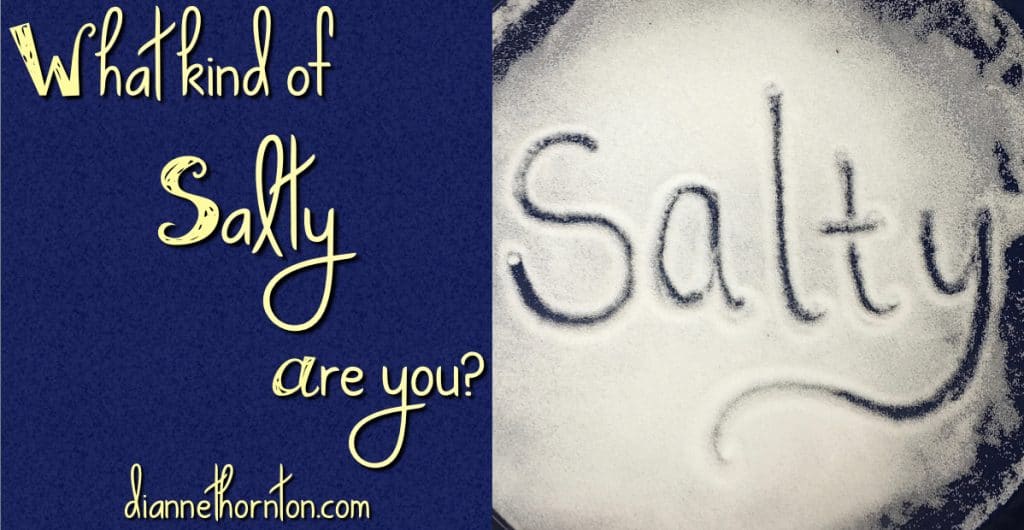Is Your Life Salty, Or Do You Make People Salty?
It’s time for another teenage-idiom. I’m always a bit startled the first time I hear my teens use one of them. Some make absolutely no sense. Some make perfect sense, once you’ve been schooled in their use. Others are used in an opposite manner from a word’s original meaning. Such is the case with today’s word: Salty.
Salty has been a favorite word for one of my girls for about a year. She uses it almost daily.
All of us were really salty at rehearsal today.
That made me soooo salty!
My friend just threw a 10-pound bag of salt on her!
My daughter’s definition of salty is simple: angry, frustrated, exasperated.
That’s not my definition. My definition of salty is too much sodium chloride!
In the right amount, however, salt is a great thing!
- Salt makes a bland dish taste delish!
- Salt melts ice on frozen highways and bridges.
- Epsom salt turns a regular bath into a joint and muscle refreshing soak.
- My dad’s favorite sore-throat remedy is a warm salt-water gargle.
A simple Pinterest search yields page after page of household uses for salt. Our bodies need salt to function properly, but too much salt can throw our electrolytes out of balance, cause us to become dehydrated, or (heaven forbid!) retain water.
But there is so much more to being salty!
In Bible times, salt had two primary purposes. One was to season food. Since there was no refrigeration, salt was also used to preserve meats and keep bacteria from growing. Jesus used this everyday material as a metaphor to describe how we should live in the world.
You are the salt of the earth. But what good is salt if it has lost its flavor? Can you make it salty again? It will be thrown out and trampled underfoot as worthless. (Matthew 5:13)
Salt is good for seasoning. But if it loses its flavor, how do you make it salty again? You must have the qualities of salt among yourselves and live in peace with each other. (Mark 9:50)
Jesus was saying that as a seasoning, our lives should cause other people to want more of what we have. It should make them thirsty for the kind of life Jesus describes in the Sermon on the Mount.
As a preservative, our lives should exhibit purity and wholesomeness. And that we should do whatever we can to keep evil at bay–in our own lives and in our community.
Together, these are powerful. Can you think of someone whose life points to Christ in a way that makes people want more? Even when they speak truth that might be difficult to hear, they don’t make people run away. That’s the kind of person I want to be.
How we talk is a pretty good indicator of our saltiness. Paul wrote the Colossians:
Salty speech is kind and gracious, yet honest and true. Share on XLet your conversation be always full of grace, seasoned with salt, so that you may know how to answer everyone. (Colossians 4:6 NIV)
Most of us would agree that the words we say and how we say them make a big difference in how our message is received. But there are other elements to consider.
Salty Speech Takes Into Account …
What words you say
How you say them
When you say them
Where you say them
When I go into my kids’ rooms at bedtime, my purpose is to tell them goodnight and that I love them. More times than not, I open the door to … uhm … a typical teenager’s room. My first reaction is …
“Oh, my! You’ve got some work to do in here. Pick up this stuff before you go to bed. Oh, by the way, I love you!”
What do you think they heard? Did they even hear me say, I love you? I’m thinking not. Instead of sprinkling a little salt, I made them salty.
I was speaking truth when I told them that they needed to pick up their rooms. But the timing for that conversation (or, ahem, directive) was waaay off. When my purpose is to wish them a good night’s sleep and to love on them–that is what I should do. The other can wait until a more appropriate time.
Another key to salty speech is where we say what we need to say. Some conversations should take place in private, especially with teenagers. I’ve seen it in public. I hate to say it, but I’ve done it, too. Some things need immediate attention. But we can always find a way to take care of them discreetly. This is the gracious thing to do.
The bottom line…
Saltiness is about how we treat others. Not so much about feeling frustrated with the latest difficulty in our lives. But if we’re not careful, our efforts to be salty, just might make someone else salty.



That was sweet! I mean salty! :0
Funny how words and expressions morph and change with generations. One word my teens have been saying is “legit.” I love that you boil the term salty down to it’s core–how we treat others.
I love this, Dianne! I never thought about the preservative message from this passage (although – duh), only the flavoring part. Good digging! I like the direction you took – are you salt or are you salty? And the application with the kids. I remember trying not to do that very thing with the whole freaking thing when I meant to say something else. A very valuable lesson, indeed. Your wisdom will be rewarded as you keep seeking Him in your parenting, girlfriend. I promise!
Tweeted, pinned, can’t wait to share this week!
hee, hee! Glad you liked it. 🙂
My kiddos say “legit” all the time, too … they are so funny! Parenting teens is tough! But sometimes … it’s downright entertaining. Thanks for the encouragement, Ginger!
Thanks, Ruthie! I appreciate your encouragement, sister!!
That’s funny, Dianne. Either the ‘salty’ slang hasn’t made it’s way to my part of the world yet or I am waaay behind the times. Thanks for cluing me in! I love how you reminded us to pay attention to our words, our attitudes and our timing. The right words said at the wrong time or in the wrong way really just loses impact. I’m so guilty of that bedtime example but now I will be thinking about what you said before those words roll out again. Thanks, my friend, I needed that! 🙂
I love how you dug deep into that analogy and pulled out a whole lot of food for thought and practical application. Thank you! 🙂
Absolutely love this post! I need to be more salty, in a good way 😉 Our words matter, and what we say reflects Christ in every way, good and bad. I pray that my words will be a reflection of him and that as I lean into Him more and more I become more salty for Christ! Thanks for sharing! I will be sharing on Pinterest + Facebook!!! Blessings new friend!
I hadn’t hear of your teen’s use of “salty” – thanks for making me aware, and for these great thoughts on being the right kind of salt for God in the world.
Such good thoughts here, Dianne! I know plenty of times when I could have picked a better time to tell my kids to clean their rooms. But I hope more often than not, they did hear me say “I love you” throughout their growing up years. Now they are grown but they still need to hear that we love them. I pray like you that I will be more “salty” for Christ and draw others to Him. Blessings to you!
These kids keep me on my toes! Keep my thinking! Thanks for stopping by, Barbara!
Thanks, Gayl. So very true — our kids, our spouses, all those we care about — need to hear that we love them — on a regular basis!
Once the Lord caught me in that … especially after a few times … I find myself biting my tongue … and then releasing it with words of kindness … closing my eyes as I walk away … I did that a couple of times this week … and two rooms are still … well, you know. But I figure … I’d rather them have good grades than a clean room! Trying to change the way I think!!
Thanks, Johanna! You certainly are a beautiful reflection of Christ!
Thanks, Stefani. It’s fun to dig! Don’t you think? Looking forward to getting to know you this year! Blessings to you!
Oh snap! This was legit. 🙂 We’re so salty when we sprinkle too much salt. This was a great study Dianne, made me think, and smile!
Same. (As my daughter says.) lol
Leave it to kids to change a word and give it a completely new meaning! What a great example of how, what and when to speak to benefit our relationships! Your writings made me remember a time where I always tried to sandwich words to my husband in kindness. I need to put that into effect!
It’s for everyone, isn’t it Lilian. Thanks for stopping by!
Hi, just wanted to let you know that I have nominated you for Liebster and Blogger Recognition awards. Read more at my post here: http://maryanderingcreatively.com/mary-andering-creatively-receives-awards/
Great use and explanation of the word salty. I have heard that expression before but I’m with you wondering where teenagers got the expressions that they say all the time. Thank you for teaching us about the word salty from the biblical perspective and how that relates to our lives. Great words today!
Wow, this was such a thoughtful and edifying post, Dianne. It’s a pleasure to share this with others because we all need it. Your example about our teenager’s room hit home with me. Point taken. Gulp. I’d better be more careful to be salty (or sweet?).